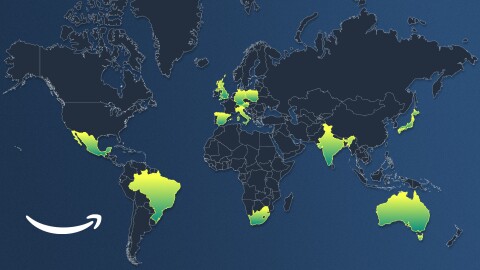As the next EU term approaches, Amazon welcomes the ambitions of EU policymakers to strengthen the Single Market – a key pillar for Europe’s competitiveness. The Report on the Future of the Single Market by former Italian Prime Minister Enrico Letta offers an important role for these efforts, and we’re committed to playing a supportive part.
In particular, Dr. Letta’s recommendations could help address the concerns of the SMEs we engage with across Europe - reforms such as simpler rules to handle VAT; the benefits of consistent labelling for consumers; a network of 'Single Market National Offices’ to help ensure the implementation of common rules; as well as underlining the benefits of greater coherence with the U.S.’s own market.
Amazon champions the Single Market
Amazon has been operating in the EU since 1998 and our various businesses reflect the value of the Single Market.
We employ 150,000 permanent employees in over half of all EU countries, who serve millions of customers across Europe.
At Amazon we believe that a strong, inclusive, and sustainable European Single Market is the winning recipe for the growth of European competitiveness, and want to play our part in strengthening it.
So much of Amazon’s innovation - from the AI in Alexa to the robotics in our fulfilment centres - comes from our over 25 European R&D centres in seven European countries.
In 2022, more than 125,000 EU-based small and medium-sized businesses (SMEs) sold products in Amazon stores, and more than 70% sold cross-border in the EU, generating more than €9.8 billion in intra-EU sales. Our digital technologies, global logistics network, multilingual customer support, and VAT registration services have made it possible for these small firms from all corners of the EU to sell to customers in Amsterdam, Paris, and Warsaw, and also to export to other continents outside Europe, to cities like New York and Tokyo. These businesses have increased EU customers’ product choices – regardless of whether they live in major cities or remote areas. We are proud to support the growth of these SMEs, which to date have created over 650,000 jobs to support their businesses on Amazon.
This content is hosted by a third party (www.youtube.com).
To view the content, you need to consent to cookies by selecting Accept all in the popup banner. Or you can go to the site footer, select Cookie Preferences, and then select On under Functional Cookies, Performance Cookies and Advertising Cookies.
Spanish and Swedish small businesses speaking about their experiences of selling on Amazon and in the EU Single Market at an event on abolishing EU trade barriers.
Single Market policies should start with SMEs
SMEs make a significant contribution to the EU’s economy. They account for 99% of all EU companies, make up almost 60% of GDP and provide two out of three jobs in the private sector. Any Single Market policy should “think small” first.
As a company working closely on a daily basis with SMEs, a supportive regulatory environment for small businesses is a priority for us. We partnered with the research organisation Implement Economics on a report, to better understand how SME-centred Single Market policies should be crafted. In the study, SMEs in 11 EU countries[1] were interviewed to learn about what they perceive as the most significant Single Market regulatory barriers impeding their growth.
88% of the SMEs interviewed state that they could increase their exports if all Member States implemented EU regulations at the same time and in the same way.
The results show that SMEs see many advantages in the Single Market, but that significant barriers remain: increasing costs, lowering profits, and eroding competitiveness. For example, 81% of SMEs surveyed claim that regulatory barriers limit their scope for doing business. The report makes several recommendations to help strengthen the effective functioning of the Single Market, including digital labelling, removing VAT barriers for exports, and conducting data flow tests for regulations – a test acknowledging the EU data protection principle, whilst minimising burdens. In fact, 90% of the SMEs interviewed argue that simplification of administrative procedures would help them conduct more business via the Single Market.
The SMEs also call for more harmonisation of EU regulation, and the inclusion of a national Single Market ombudsmen, upgrading the European Semester for improved regulatory harmonisation and compliance, as well as strengthening the Better Regulation Toolbox to enhance focus on regulatory implementation and impact. Lastly, the recommendations address barriers to a green Single Market, such as fragmented EPR schemes, and barriers to trade in climate goods and services. Read more about the report’s findings here, which we have incorporated into our policy priorities.
Xavier Flamand, Amazon’s Vice President for EU Seller Services, said: “This study shows that regulatory and bureaucratic complexity is limiting the opportunities Europe’s small and medium businesses have to take advantage of all the Single Market could offer. At Amazon we believe that a strong, inclusive, and sustainable European Single Market is the winning recipe for the growth of European competitiveness, and want to play our part in strengthening it. In 2022, we invested over €8 billion in logistics, services, tools, and training across Europe to help the 125,000 EU-based SMEs selling products in Amazon stores to unlock their potential through the online channel. More than 7 in 10 of those SMEs generated intra-EU sales totaling more than €9.8 billion – showing just how important supporting their success is to Europe’s economies.”
Amazon’s recommendations for a strong Single Market
The design and creation of an EU Single Market has been a success, and the EU now needs to adjust its policies to improve how it delivers for citizens and local businesses with a long-term perspective. A properly functioning Single Market will boost the European economy and strengthen the EU’s competitiveness on the global stage. An open Single Market, with close cooperation with democratic partners, is the best way to increase prosperity and continue to attract global investments.
The EU is at an inflection point.
To reach this potential, we recommend increased ambitions to enforce and complete the Single Market with nine concrete recommendations, which we have described in more detail in our EU2024-2029 Single Market Policy Brochure.
We will continue to contribute to the long-term success of the Single Market, and look forward to partnering with EU policymakers towards our shared goal of a competitive Single Market that delivers for both citizens and SMEs.
Read what Amazon’s leaders say about policy priorities for the Single Market:
- David Zapolsky - General Counsel & Senior Vice President of Global Public Policy: A sustainable Single Market that makes the EU strong, prosperous, and green
- Lucy C. Cronin - Vice President for EU Public Policy: Belgium’s EU Presidency – A competitive EU supported by a strong and green Single Market
- Rocco Bräuniger - DACH Country Manager: The Single Market at full potential: Making Europe sustainable, prosperous, and strong
[1] Sweden, Austria, Czechia, Denmark, Spain, Ireland, Poland, France, Germany, Italy and Belgium.












